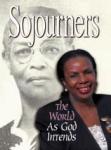In his foreword to Beyond Theological Tourism: Mentoring as a Grassroots Approach to Theological Education, Walter Wink writes, "I suggest that for our next sabbatical we visit the United States." Apt words for a book that challenges the reader to "come home," to see our neighborhoods with the fresh eyes not of a tourist looking for the exotic, but as students and participants ready to learn from the mentors and teachers who live there—the poor, prostitutes, the homeless.
Edited by Susan Thistlethwaite and George Cairns, the book is written for those who train church leaders and who seek to both transform and be transformed by the context in which we live. It challenges the way we educate seminarians and provokes seminaries to see themselves as part of a neighborhood, a community of people who have something to share and teach the future leaders of the church.
Four Chicago-area seminaries banded together to create a new model for theological education: Chicago Theological Seminary, Lutheran School of Theology, McCormick Theological Seminary, and Catholic Theological Union. The project was meant to challenge a kind of "theological tourism," where professors and students visit oppressed communities without truly participating as subjects in the subjectivity of the marginalized.
Participants were involved in three international immersions, each lasting three weeks, and one local immersion. They were to be "leaven in the loaf," passionate catalysts who would provoke institutional change and assist in the "globalization"—defined by Thistlethwaite to mean "the uncentering of Euro-Atlantic culture and theology"—of their seminaries. Participants realized that the city had lots to teach them: Christ was already active in the local culture and in the lives of those whom they met, whether in a shelter for women and children or at Genesis House, a hospitality house for female prostitutes.
The premise of this model for theological education is clear. In the words of one author: "Any minister whose theology is not being tested in the fire of experience, and any minister who is a stranger to the experience of human deprivation and suffering is not credibly engaged with the human community she purports to serve. Not only do we fail to hear the cries of the poor, but we also fail to be instructed by their own theology and experience of God, justice, the church, and of other Christians."
THIS BOOK OFFERS not only a model for seminaries but one that could also be adapted for congregations. Using it in a congregational setting encourages congregants to immerse themselves in their neighborhoods and humbly become students of the residents just across the street who may not worship with them on Sunday morning. Who can imagine the outcome of this model for communities of faith, the neighborhood, and the individuals involved?
Another powerful dimension of the book is its critique of tourism as an industry. In the first chapter, Thistlethwaite suggests that tourism sustains an international political system; she sees a profound relation between this type of travel and "patterns of international trade, debt, investment, treaties, and, ultimately, new forms of colonialism. Furthermore, the appearance of objectivity, of non-involvement of the tourist, must be subject to critique." Although Thistlethwaite fails to provide the link between a critique of tourism and this new model of theological education, her chapter is well worth the read.
The book also lacks follow-up of the experiences of the Chicago seminaries. How did the project globalize these four seminaries? How did the mentors benefit from this experience? I was left wanting to know more.
To anyone interested in theological education, the poor, travel, and tourism, and the training of church leaders for the next millennium, this book is essential. After reading it, I immediately visited with the president of the seminary from which I graduated and suggested a new model for training and teaching church leaders. —Susan Tjornehoj
SUSAN TJORNEHOJ is assistant to the bishop of the St. Paul Area Synod of the Evangelical Lutheran Church in America.
Beyond Theological Tourism: Mentoring as a Grassroots Approach to Theological Education. Susan Thistlethwaite, George Cairus, editors. Orbis books, 1995.

Got something to say about what you're reading? We value your feedback!